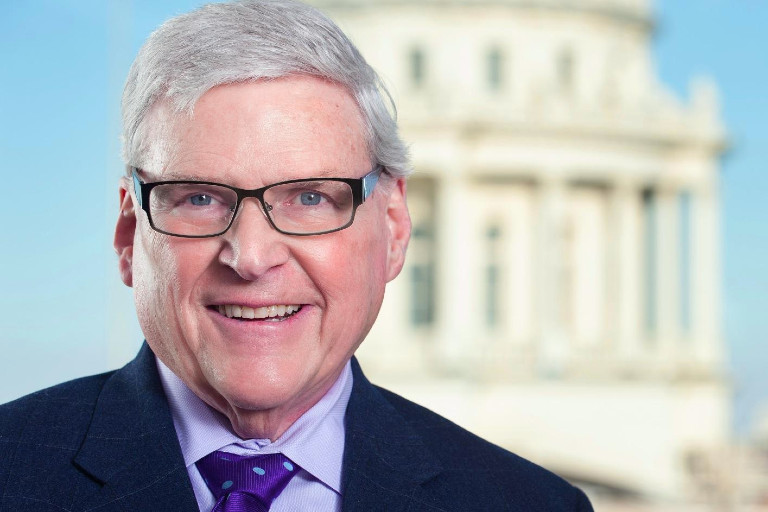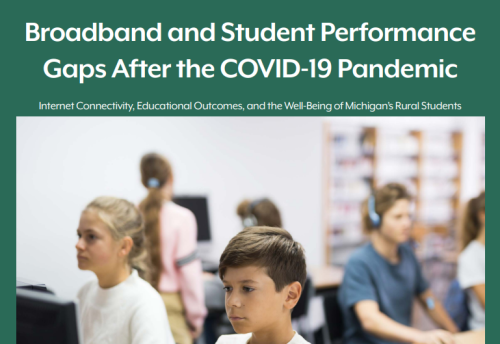
Constitutional scholar establishes endowed chair and fellowship for freedom of expression
Richard D. McLellan took classes in Caribbean history and canoeing while a student at Michigan State University in the early 1960s. But it was the study of words and his reverence for the First Amendment that charted his course, inspiring him to establish an MSU endowed chair and fellowship focused on freedom of expression.
A respected attorney, constitutional scholar and lobbyist, McLellan earned his bachelor’s in advertising from the College of Communication Arts and Sciences in 1964, then his law degree from the University of Michigan in 1967. His career has involved consulting on fair and free elections in emerging democracies, political transitions, and private law practice. He has served in a range of public service positions in Michigan and on advisory and leadership boards in higher education—including the MSU Quello Center and MSU College of Law. Despite a varied career that has taken him around the globe, McLellan has never forgotten his roots in southwest Michigan and his first love of journalism.
“I was always interested in journalism,” he said. “When I was in high school, I was the editor of the yearbook and school newspaper. I took some assessments before college, and they said I would either be a journalist or a lawyer. Both focus on words and language. I guess that’s my thing.”
In late 2020, McLellan affirmed his regard for language and free speech by creating the John M. Engler Endowed Chair in Freedom of Expression. He also jump-started the Richard D. McLellan Graduate Fellowship Fund to support graduate student research in freedom of expression, including the legal and social implications of digital and social media.
“Richard is a passionate supporter of free speech and believes in the importance of high-quality, rigorous research to inform policy,” said Johannes Bauer, Quello Chair in Media and Information Policy. “The gifts enable MSU to recruit top scholars to research and teach important and controversial issues related to free speech, and to educate the next generation of citizens and scholars.”
For the love of words
McLellan was born in Peoria, Illinois. He lived in multiple countries and U.S. cities before his family settled in the Michigan village of Paw Paw. His father was in the food business, running a pineapple factory in Hawaii when McLellan was 2 years old. After that, his parents relocated to Long Beach, Indiana, Mexico City and New York before moving to Michigan.
When it came time for college, McLellan knew he wanted to go someplace other than the small Mid-Michigan college where his mother and father met. He picked MSU, and started out in journalism, buffered by several financial scholarships.
“I switched to communications after a while, and my adviser placed me in the honors college when he saw I was having a hard time deciding what to do,” he said. “I took anything and everything that started after 10 a.m. and ended before 3 p.m. before graduating and deciding to go to law school.”
McLellan said his passion for freedom of expression ignited at MSU—primarily through his activities with student government and political groups. When a student socialist group was barred from bringing in a speaker from the Communist Party, McLellan fought for the right for the speaker to be heard. He also helped transform regulations that made it difficult to bring speakers to campus, but not without putting up a fight and rallying diverse political points-of-view outside his own.
“As a student, I felt you should be able to listen to anyone,” he said. “I might not have agreed with what they said, but I felt it was wrong to ban free speech.”
That early involvement in free speech shaped McLellan’s lifelong quest to uphold the First Amendment and civil discourse. A believer in education, he shared his knowledge through state-wide political leadership programs, and taught and lectured at MSU in the College of ComArtSci and the College of Law.
Fostering Freedom of Expression
About three years ago, McLellan was undergoing rehabilitation related to an illness and was visited by MSU colleagues. He told them he wanted to contribute to programs that fostered principles he had cared about his whole life. Through conversation, he arrived at the idea of establishing the endowed scholarship and fellowship devoted to free expression.
McLellan said his primary intent is to institutionalize free speech as a value during a time when many principles of free expression are being challenged. He remembers the events he saw unfolding in emerging democracies in the 1990s that hadn’t had free speech in decades, and how the principle flourished and transformed nations.
Often, he reminisces about his times at MSU, and the days when he worked with other students to ensure all points-of-view could be heard.
“I figure that every year, there is a whole new group of people like I was,” he reflected. “They are young and interested in free speech. My hope is they go to MSU and find a platform to explore their interests through communications arts or through the law. I just know the issue of free expression never goes away.”
In addition to McLellan’s recent gifts, McLellan has supported MSU by contributing to programs that support the exchange of ideas between law students and high school journalists through seminars and lectures on freedom of information and expression. To date, McLellan has gifted or pledged more than $3 million to the university to support research and education in the communication arts and sciences and law areas.
By Ann Kammerer



